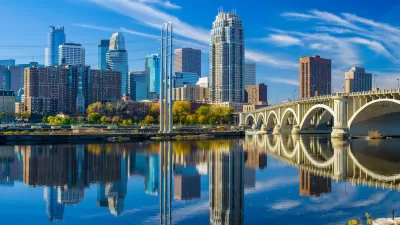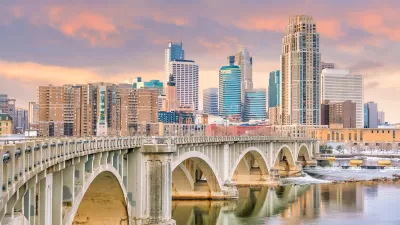The nation mourned the ten-year anniversary of the tragic collapse of the I-35W Bridge in Minneapolis this week.

Michael Grass writes:
Flags stood at half-staff on Monday across Minnesota to mark the 10th anniversary of the collapse of the Interstate 35W Bridge in Minneapolis, an event that killed 13 people and injured 145 more after a gusset plate failed during the evening rush hour, causing the half of the 1,907-foot structure to fall into the Mississippi River.
Grass takes the 10th anniversary of the tragedy as an occasion to evaluate the lessons from that "major wake up call" on the state of the nation's infrastructure. The obvious conclusion: that the nation has done little to improve the safety of its roads and bridges. For instance, the Federal Highway Administration considered the I-35W Bridge a "fracture-critical bridge" when it collapsed. In 2017, there are 18,000 fracture-critical bridges in the United States.
For local coverage of the ten-year anniversary of the tragedy, see an article by Dylan Thomas for The Journal.
FULL STORY: It’s Been 10 Years Since the Deadly I-35W Bridge Collapse in Minneapolis

Planetizen Federal Action Tracker
A weekly monitor of how Trump’s orders and actions are impacting planners and planning in America.

Maui's Vacation Rental Debate Turns Ugly
Verbal attacks, misinformation campaigns and fistfights plague a high-stakes debate to convert thousands of vacation rentals into long-term housing.

San Francisco Suspends Traffic Calming Amidst Record Deaths
Citing “a challenging fiscal landscape,” the city will cease the program on the heels of 42 traffic deaths, including 24 pedestrians.

Amtrak Rolls Out New Orleans to Alabama “Mardi Gras” Train
The new service will operate morning and evening departures between Mobile and New Orleans.

The Subversive Car-Free Guide to Trump's Great American Road Trip
Car-free ways to access Chicagoland’s best tourist attractions.

San Antonio and Austin are Fusing Into one Massive Megaregion
The region spanning the two central Texas cities is growing fast, posing challenges for local infrastructure and water supplies.
Urban Design for Planners 1: Software Tools
This six-course series explores essential urban design concepts using open source software and equips planners with the tools they need to participate fully in the urban design process.
Planning for Universal Design
Learn the tools for implementing Universal Design in planning regulations.
Heyer Gruel & Associates PA
JM Goldson LLC
Custer County Colorado
City of Camden Redevelopment Agency
City of Astoria
Transportation Research & Education Center (TREC) at Portland State University
Jefferson Parish Government
Camden Redevelopment Agency
City of Claremont





























